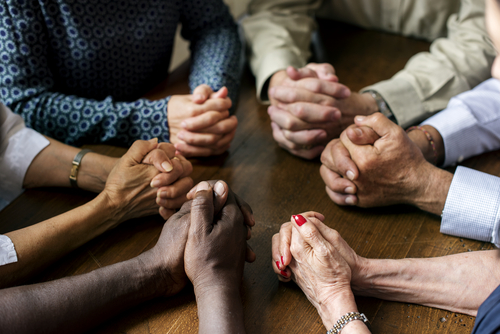The words we use in our spoken liturgical prayer reflect our beliefs and also stretch us into new understandings of those beliefs. The words we use form us as individual Christians, and as church, a people of God. They give our communal worship a unified voice, shaping a vision that sets us on a path forward to who we are becoming.
In this context of public, communal prayer and worship, our rituals include the tradition of penitential prayer. We acknowledge not only our individual failings, omissions and sinful behavior, but also our communal or systemic and social sins.
These are not sins we may necessarily commit personally, but ones in which we are complicit through the systems of our economy, culture or government.
The most pressing issues for which we are called to repent as a people and seek God’s forgiveness today might include:
- rn
- the violence we do to one another as a result of racism and ethnic discrimination
- a culture of abuse in which those with power choose to violate or oppress others
- a reckless use of the goods of the earth and a lack of careful stewardship of creation
- an economic structure that unquestioningly serves the wealthy and continues to hurt the poor
- the ignorant abuse of freedom as a means for self-aggrandizement
- a culture of individualism, greed and narcissism that has forgotten solidarity and the mission of a common good for all people
- a culture of death that has allowed the Holocaust, nuclear armaments, abortion, assisted suicide and euthanasia
rn
rn
rn
rn
rn
rn
rn
rn
We need to pray about these issues, and pray mightily. We cannot ignore them.
Last week we discussed small ways that we can address these sins in words used at Mass in the prayers of the penitential act and in the intercessions of the Universal Prayer.
The Mass is not our only liturgical prayer time, though. We can gather to pray as a community for what some might call “Liturgies of Lament” (title taken from Liturgy Training Publications, 1994, J. Frank Henderson.).
In the Appendix II of the Rite of Penance ritual book there are many options for communal penance services. These services are not the Sacrament of Reconciliation. They do not include absolution. They can be used as prayerful preparation for the sacrament, but are more appropriately used as opportunities for public communal (liturgical) prayer that focuses on forming us in a spirit of repentance, both personal and social.
In this context, together, we express our sorrow, ask God for forgiveness, and pray for the wisdom to change our systems and behaviors. The words of these services outlined in the appendix of the Rite of Penance ritual book can easily be adapted to reflect communal repentance for our systemic and social sins.
Here is the basic outline of these penitential prayer services:
- rn
- Song
- Call to repentance
- Silence (all kneel or bow heads)
- Introductory comments by the presider (all stand)
- Opening Prayer
- Reading (all sit)
- Silence
- Responsorial Psalm — perhaps one of the Psalms of Lament (Communal Psalms of Lament include 12, 44, 58, 60, 74, 79, 80, 83, 85, 89, 90, 94, 123, 126, 129, 137)
- Gospel (all stand)
- Homily (all sit)
- Silence
- Examination of Conscience — examining our systemic and social sins
- Silence
- Act of Repentance — perhaps a litany or some kind of ritual symbolic action (all stand)
- Lord’s Prayer
- Closing Prayer
- Song
rn
rn
rn
rn
rn
rn
rn
rn
rn
rn
rn
rn
rn
rn
rn
rn
rn
rn
Currently, our North American culture seems to be dominated by forces that threaten justice, love, peace and the common good for all humanity. We need to name the forces imbedded in our social structures that work against the Gospel of Jesus Christ, repent of those sins, and through praying together, strengthen our spiritual resolve to break down their dominance and build up the kingdom of God.
The weeks of Advent or Lent might serve as particularly poignant times to come together and pray these penitential liturgies. Parishes could offer a penitential service in each of the weeks of these seasons, culminating in the traditional Sacrament of Reconciliation in the final week before Christmas or before Holy Week. Each week of the season, the penitential prayer could focus on the expression of sorrow for a specific social sin. Liturgy committees might want to take a close look at Appendix II of the Rite of Penance.
Prayer changes us, illumines us, motivates us, calls us to God’s will. Communal penitential prayer grows our communion as the body of Christ. It strengthens us in holiness and Gospel values. It shines a light on sin and brokenness.
Our full, conscious and active participation in liturgical prayer opens us up to God’s way for the world, and to the work of building the Kingdom of God.

